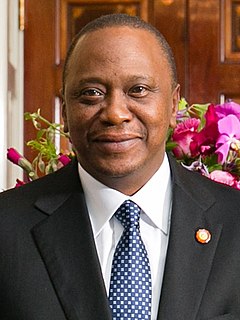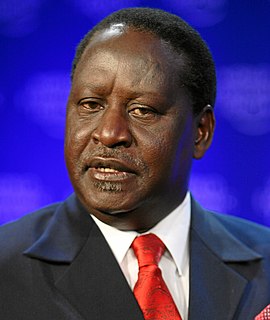
The politics of Kenya take place in a framework of a presidential representative democratic republic, whereby the President of Kenya is both head of state and head of government, and of a multi-party system in accordance with a new constitution passed in 2010.

The National Rainbow Coalition (NARC) is a political party in Kenya. As an alliance, it was in power from 2002 and 2005 when it collapsed due to disagreements between members over a constitutional referendum.

Uhuru Muigai Kenyatta is a Kenyan politician and businessman who is the fourth and current President of the Republic of Kenya. He served as the Member of Parliament (MP) for Gatundu South from 2002 to 2013. Currently the party leader and a member of the Jubilee Party of Kenya, he was previously involved with The National Alliance and before that the Kenya African National Union.

William Kipchirchir Samoei Arap Ruto is a Kenyan politician who has been Deputy President of Kenya since 2013. He served as the Acting President of Kenya between 5 and 8 October 2014 while President Uhuru Kenyatta was away at the Hague.He previously served in various ministerial positions including the Ministry of Home Affairs, the Ministry of Agriculture and the Ministry of Higher Education Science and Technology. He was Secretary General of KANU, the former ruling political party, and MP for Eldoret North Constituency between December 1997 and January 2013. He won the seat in the 1997 Kenyan election after defeating Reuben Chesire. He was appointed to the position of Assistant Minister in the Office of the President by President Daniel arap Moi in 1998. He was promoted to be Minister for Home Affairs in August 2002. He also previously served as the Chairman of the Parliamentary Select Committee on Constitutional Reform in the 9th Parliament.

Wycliffe Musalia Mudavadi is a Kenyan politician, who served as the seventh Vice President of Kenya in 2002 and as Deputy Prime Minister from 2008- 2012 May when he resigned officially to join the presidential race. He is the current Party Leader of Amani National Congress (ANC) after decamping from the Orange Democratic Movement (ODM) led by the prime minister Raila Odinga in 2012 where before his resignation he served as the deputy party leader.He was third in the Kenyan general election, 2013.

Raila Amolo Odinga is a Kenyan politician who served as Prime Minister of Kenya from 2008 to 2013, and has served as Leader of the Opposition since 2013. He was Member of Parliament (MP) for Langata from 1992 to 2013. He served in the Cabinet of Kenya as Minister of Energy from 2001 to 2002, and as Minister of Roads, Public Works and Housing from 2003 to 2005. Odinga was appointed High Representative for Infrastructure Development at the African Union Commission in 2018.

The Orange Democratic Movement (ODM) is a centre-left political party in Kenya. It is the successor of a grassroots people's movement which was formed during the 2005 Kenyan constitutional referendum campaign. This movement separated in August 2007 into the Orange Democratic Movement Party of Kenya and the Wiper Democratic Movement – Kenya.

The Wiper Democratic Movement–Kenya (WDM-K) refers to a political party in Kenya, which originated as a result of the 2005 Kenyan constitutional referendum. It grew out of the Orange Democratic Movement Party of Kenya (ODM). It is headed by Kalonzo Musyoka, who ran for president in 2007 and served as the vice-president in the Grand Coalition of Mwai Kibaki and Raila Odinga. It is now a member of the main opposition NASA.

General elections were held in Kenya on 4 March 2013. Voters elected the President, members of the National Assembly and new Senate, as well as County Governors and Representatives. They were the first elections held under the new constitution, which was approved in a 2010 referendum, and were also the first run by the new Independent Electoral and Boundaries Commission (IEBC).

The Supreme Court of Kenya is the highest court in Kenya. It is established under Article 163 of the Kenyan Constitution. As the highest court in the nation, its decisions are binding and set precedent on all other courts in the country.
The inauguration of Uhuru Kenyatta took place 9 April 2013. Kenyatta won 50.07% of the vote in the 2013 presidential election.

The Kenya Presidential Election Petition of 2013 was an election petition aiming to declare the Kenya presidential election 2013 invalid. The Petition was filed at the Supreme Court of Kenya on 16 March 2013.

The National Alliance (TNA) was a political party in Kenya. It attained its current identity when it was taken over by Uhuru Kenyatta and rebranded as the vehicle for his 2012 presidential campaign.
The Raila Doctrine simply states .....a presidential election, which is not free and fair, should never be acceptable in a democratic country. It was coined if reference to Raila Odinga reacting to his losses in elections in Kenya, which he has termed as fraudulent. The phrase was coined in a legal argument by Senior Counsel Ahmednasir Abdullahi representing the IEBC during the Kenyan Presidential elections petition that was heard by the Supreme Court of Kenya in March 2013. The doctrine simply states .....a presidential election, which is not free and fair, should never be acceptable in a democratic country.

The Jubilee Party of Kenya is the ruling political party that was formed after the merger of 11 political parties, to become one of the major political parties in Kenya. The ceremony announcing the merge was held at the Safaricom Kasarani Stadium on 8th September 2016. The formation of the party was the result of an alliance by the principal members of the Jubilee Alliance party, as well as 10 other political parties. These parties were:
- Jubilee Alliance Party (JAP)
- Alliance Party of Kenya (APK)
- United Republican Party (URP)
- Grand National Union (GNU)
- New FORD–Kenya (NFK)
- FORD People (FP)
- United Democratic Forum (UDF)
- Chama Cha Uzalendo (CCU)
- Republican Congress (RC)
- The National Alliance (TNA)
- The Independence Party (TIP)

The National Super Alliance, known by the abbreviation NASA, is a Kenyan political coalition of opposition center-left parties that was formed in January 2017. These parties include the Orange Democratic Movement (ODM), Wiper Democratic Movement (Wiper), Forum for the Restoration of Democracy - Kenya (FORD-Kenya), Amani National Congress (ANC), National Rainbow Coalition, Progressive Party of Kenya, Chama Cha Uzalendo (CCU), and the Muungano Party (MP).
Tom R was the main opposition candidate in the 2007 presidential election, running against incumbent Mwai Kibaki. [3] In the subsequent presidential election 5 years later he placed second against Uhuru Kenyatta, garnering 5,340,546 votes, which represented 43.28% of the total votes cast.[4] He made another run for the presidency in August 2017 against Uhuru Kenyatta and lost [5] after the chairman of the electoral body declared Uhuru Kenyatta as the winner with 54% of the votes cast to Raila's 43%.[6] This outcome was eventually annulled by the Supreme Court following findings that the election was marred by "illegalities and irregularities". A subsequent fresh election ordered by the Court was won by Uhuru Kenyatta when Raila declined to participate citing inadequate reforms to enable a fair process in the repeat poll.

Fresh Presidential elections were held in Kenya on 26 October 2017 following the Supreme Court's annulment of the results of the presidential vote in the August 2017 general elections.
Roselyn Kwamboka Akombe is a Kenyan former commissioner of the Independent Electoral and Boundaries Commission (IEBC) of Kenya.



















